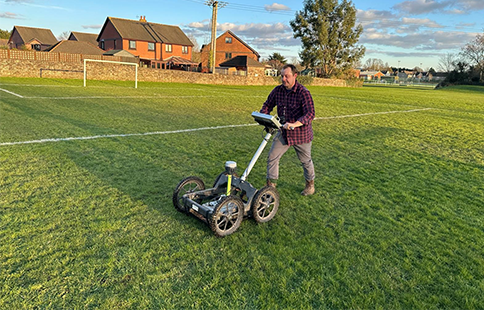Archaeology team appeals for help to uncover Elizabethan Manor with interesting Black history

12 March 2024
Archaeologists from the Royal Agricultural University (RAU) are appealing for help to find out more about a large Elizabethan house which once stood in, what is now, a Lydney secondary school’s playing fields.
The house - Whitecross Manor - was built in the 1570s for English mariner and landowner Admiral Sir William Wyntour, on land which is now home to the Dean Academy (formerly Whitecross School) in the town’s Church Road, but it was burned and demolished in April 1645 during the Civil War.
Involving students from the RAU’s Cultural Heritage Institute, based at the University’s Swindon campus, the investigation is being led by Professor Mark Horton, the RAU’s Pro Vice-Chancellor Research and Enterprise who is also a well-known archaeologist with many years’ experience and who himself lives in the Forest of Dean.
The team, which is currently conducting surveys of the land using modern geophysical techniques such as ground penetrating radar and a magnetometry survey, is hoping that local people, and former Whitecross School students, will help its research.
Professor Horton said: “This site was originally investigated in the 1970s and mid-1980s, as well as briefly in 2003, but many of the early finds were sold or dispersed before the Dean Heritage Centre opened and there are few records of the previous archaeological investigations.
“To help us reconstruct what was there as best we can, we are very keen to track down any objects that may have been found all those years ago. Perhaps people have photographs they took at the time which they might be able to share with us?
“We know that many Whitecross School students took part in previous site digs and they may have information and artefacts. We have already met some who were very helpful and had a pipe from the 1660s but we would be really pleased to hear from anyone who has anything connected to this site.”
Among the missing finds is a near complete Elizabethan rapier, which was sold at auction in 1958, as well as numerous potsherds and pipe fragments.
As part of the new study of the site, the team has been mapping the buried walls in three dimensions, as well as locating many of the outbuildings and wells, to provide a detailed plan of the house and grounds before the dig starts later in the year. They are also looking to understand the gardens and how the walls were prepared to defend the mansion in the Civil War.
Professor Horton added: “Whitecross is a fascinating place. Because this house was lived in for such a short time, it’s an amazing Tudor time capsule telling the story of an Admiral, courtier. and his entourage.
“It’s also the location of some of the earliest evidence of a black servant in a domestic household, possibly brought back to England by Sir Francis Drake during his expedition to West Indies in 1585-6.
“A court case in 1597 recorded how black servant Edward Swarthe was whipped in the Great Hall of the Manor before a crowd assembled by a certain John Guy who we believe was the famous Bristolian who subsequently became Lord Mayor of Bristol and founded the first permanent England settlement at Cupits in Newfoundland in 1610.
“Sir William Wyntour was a major sponsor of Drake’s voyages, including the famous circumnavigation in 1577-80, and it is likely that much of the money to build the house came from Drake’s privateering activities. It would be fascinating to learn if any of Drake’s souvenirs ended up at Whitecross.”
The project aims to combine new and old evidence to give a complete view of the house and also its relationship to the old Lydney quay, which came close to St Mary’s Church.
Richard Brand, Headteacher of the Dean Academy, welcomed the new investigations. “It will be a great opportunity for our pupils to learn more about the history under their own playing fields and for the opportunity to work with academics from one of Gloucestershire’s universities in solving these historical mysteries,” he said.
Dr Roger Deeks, Vice Lord Lieutenant of Gloucestershire who has an interest in Forest of Dean history, added: “The investigation by Professor Mark Horton and colleagues from RAU has triggered interest in a seminal period of one hundred years in Forest history which connects the Lydney locality to the Caribbean, wars with Spain and its forgotten maritime history.”
If you have any information that might help Professor Horton and his team, please get in touch with Professor Horton at mark.horton@rau.ac.uk